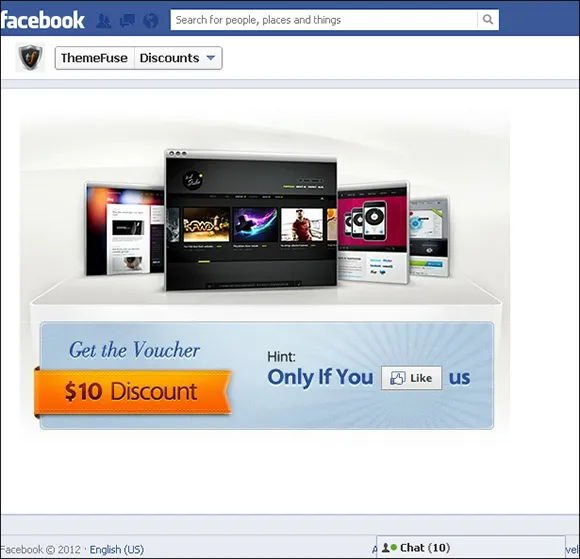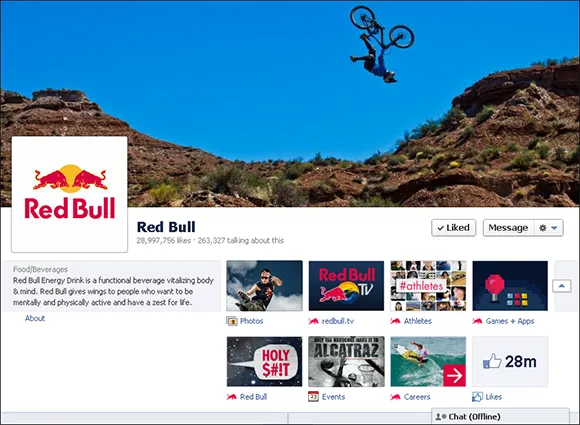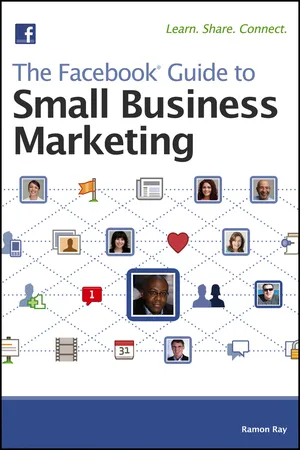chapter 1
Learning Facebook Basics
Can you remember what life was like before Facebook? You sent e-mails to friends. Maybe you participated in online chats and you might (just might) have watched some online video. However, to really keep up with your friends, family, customers, and colleagues, you talked to them on the phone or visited them face to face. Facebook and other social networks have changed all that. You now get status updates the moment your daughter gets her first job and you see photos of your customers using one of your products. This is the power of Facebook and the power of social media: It brings people together online to discuss common interests. This chapter explains what social media and Facebook are all about.
The Power of “Social” in Social Media
Content Is King and Customer Engagement Is Queen
What Is Facebook?
The Power of “Social” in Social Media
Although direct e-mail and flyers in the Sunday newspaper are still great ways to attract new customers or engage with the ones you have, social media enables marketers (that’s you) to work in a new dimension.
With social media marketing, you are able to do more than just sell your product — you can leverage the power of your customers to tell others about your products, services, or brand within the context of their social networks. Social media is also powerful because you can find customers who are already talking about your specific product or company or about something related to your industry.
According to a June 2011 blog post by ClickZ, social media is a proven success for marketing very “sexy” products, especially those that are focused on consumers. When companies offer money or discounts to customers in exchange for “liking” them on Facebook, many of their customers (and new customers) sign up for the offer (see Figure 1.1). The challenge has been for companies who are also trying to attract new customers and get them to take deeper action, such as signing up for a new bank account or buying a product.
However, companies are finding that social media is indeed a very powerful way to get people to encourage others to take action. For example, a ClickZ blog post reports that Discover Card created a social media referral program that rewarded card holders $50 for each friend they got to become a card holder. And Zecco Trading, an online investing site, offered its customers $75 for every friend who opened and funded a new Zecco Trading account. The company realized a big increase in new accounts by offering incentives.
Social media is an explosively powerful way to get customers to influence their friends to take favorable action toward your brand, product, or service. It just takes creativity and thinking through who to best use on Facebook to influence those decisions.

Half the success in getting the most out of Facebook is knowing how to use it. The other half is knowing what creative ways you can use to engage your audience to take profitable action.
So do you see why Facebook can be so powerful? Facebook has a billion users, all connected in one way or another. Diving into this swimming pool of connectivity means that your customers and potential customers can engage with your brand through photos, coupons, videos, surveys, polls, and so many other things.

1.1 Businesses offer discounts to consumers for liking their Facebook Pages.
Content Is King and Customer Engagement Is Queen
Before diving into Facebook, you should understand the importance of content and customer engagement. Creating high-quality content is one of the key aspects of using social networks to engage your audience.
People, be they business owners, stay-at-home moms, soccer dads, corporate lawyers, or cooks at local restaurants, want online content. They either want to be entertained (Hulu, YouTube) or they want to be informed (Wikipedia, HowStuffWorks.com).
People’s interests span a wide range of topics — the location of the nearest restaurant, how to get rid of a nagging headache, intricacies of real estate law, and anything else relevant to their business or personal lives. This is why, in regard to your own business, content is so important. People on Facebook are looking for information, not just a product to buy. It is important that you have the information they want so that when they are ready to buy, they will associate that found information with the product that you are selling.
People (and remember, people run businesses and buy business products for their businesses) are not just looking for content. They also like to be engaged. They want to comment on your posts, send you a video of them using your product, take a survey, and so on. All these things and more are engagement.
Almost 1 billion people are on Facebook — this is clear evidence that people want content (which Facebook helps produce) and engagement with each other (which Facebook also helps facilitate).
It is important to sell and market your products and services, but it is equally (and maybe even more) important to create valuable content so that customers can not only find you online but also can engage and interact with you (see Figure 1.2).

1.2 Red Bull’s Facebook fans not only get information about its products but also are asked to engage in polls and share their experiences with the company and other followers.
What Is Facebook?
Most people think they know what Facebook is, and for the most part they’re right. However, many people use Facebook and really have no clue what it is or what it can do for them. The rest of this chapter reviews some of Facebook’s key features. You explore why the world (or the almost 1 billion people in the world on Facebook) is so enamored with Facebook. You then learn why people are excited about using Facebook for business.
Why are individuals using Facebook?
Facebook is a platform that enables users to share information about themselves with friends. Friends are the individuals within the Facebook community to whom you give permission to connect and share information. This information, shared through status updates, enables friends and those who “like” your Pages to receive updates from you and for you to share information about yourself. Status updates appear when you post to your Facebook Timeline — all those in your community (who have liked your Page or are your friend) see your updates.
You can do more than just post messages on your Facebook Timeline — Facebook enables you to use tools for event notifications, videos, photos, and more.
An ecosystem of independent software developers has grown to create third-party applications for Facebook. These applications take Facebook’s platform and layer games, utilities, and collaboration tools on top of it, allowing users to do even more with Facebook.
Why are small businesses using Facebook?
The goal of any business — including yours — is to find where your customers are and market to them to ultimately sell more of your product or service. With over 60 percent of the U.S. population on Facebook, nearly every business is now looking at the social network as a new medium to reach current and potential customers.
Facebook is an ideal platform to engage with your current customers and advertise to find new customers. I discuss more on this later.
By leveraging the same tools available for consumers and creating their own applications, businesses can complement their existing online marketing with the power of Facebook.
Maybe you are using Eventbrite to manage your customer appreciation events. Now you can give customers an option to register through Facebook. Maybe your customers are not thrilled about signing up for a traditional e-mail newsletter — they can now get your updates through Facebook.
Are you starting to understand why 1 billion people are on Facebook and how your business can benefit?
Because Facebook has almost a billion users and dozens of groups and apps per person, it’s important that you work to bring your brand to Facebook and Facebook to your brand. Consider a fictional local florist who owns a flower shop in the suburbs. While many customers talk about this florist using traditional word of mouth, many also share pictures of her floral arrangements on a variety of online forums, including Facebook. Most of all, her customers are on Facebook, and it’s therefore essential that she create a corporate Page to engage with customers, letting them comment and share their experiences. In her flower shop, she could post a sign by the cash register that says “Post photos of your favorite flower to our Facebook Page this week for a chance to win a free floral arrangement.” This is bringing Facebook to your brand.
Many businesses are still experimenting with the results of their efforts with social media in general. Having said that, studies indicate that approximately 40 percent of small businesses...
